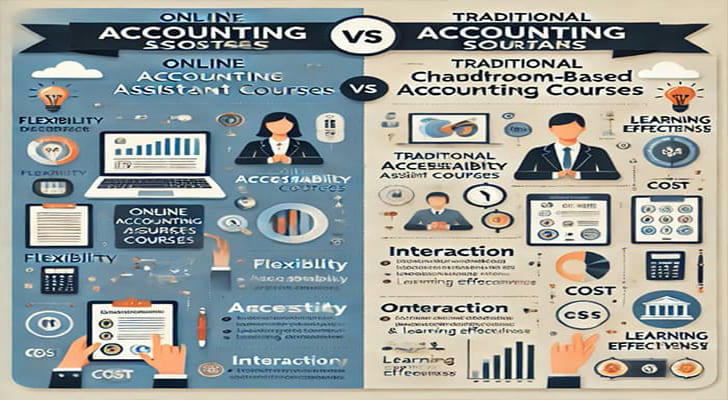Online Learning for Accounting Assistants: A Convenient and Efficient Option

For busy professionals, time is of the essence. How to improve one's professional skills without compromising work has become a major challenge. Online accounting assistant courses offer a highly efficient and convenient way for working professionals to continue their education. They not only satisfy professionals' thirst for knowledge but also flexibly fit into busy work lives. Research shows that online learning has become the preferred method for professionals to enhance their skills. With the continuous development of internet technology, online learning platforms offer increasingly rich content and stronger interactivity, allowing learners to study anytime, anywhere, and in a personalized manner.
Advantages of Online Accounting Assistant Courses for Working Professionals
Online accounting assistant courses offer exceptional convenience for busy professionals. Compared to traditional in-person training, online learning has several significant advantages:
Flexibility and Time Efficiency
• Personalized Learning Paths: Online platforms tailor learning paths to individual learners based on their knowledge, goals, and progress, ensuring the content is relevant and effective.
• Data-Driven Evidence: According to McKinsey, personalized learning can improve learning outcomes by over 30%.
Enhanced Learning Efficiency
• Microlearning: Online courses break down content into smaller, more manageable modules, allowing learners to focus on specific topics and improve retention.
• Interactive Learning: Features like online quizzes and simulations reinforce knowledge and enhance learning outcomes.
• Data-Driven Evidence: Research indicates that interactive learning can improve learning outcomes by over 40% compared to traditional lecture-based methods.
Expanded Career Opportunities
• Industry Certifications: Many online platforms offer certifications recognized by industry bodies, boosting career competitiveness.
• Networking Opportunities: Online learning communities provide a platform for networking with industry professionals.
• Data-Driven Evidence: LinkedIn data shows that professionals with relevant certifications generally earn higher salaries.
Improved Corporate Training Outcomes
• Reduced Training Costs: Businesses can reduce training costs by using online platforms.
• Increased Employee Satisfaction: Online learning offers flexibility and meets diverse learning needs, improving employee satisfaction.
• Data-Driven Evidence: Forrester research shows that online learning can reduce training costs by 30% to 60%.
| Feature | Online Accounting Assistant Courses | Traditional Accounting Assistant Courses |
|---|---|---|
| Flexibility | High: Learn at your own pace, anytime, anywhere. | Low: Requires attendance at fixed times and locations. |
| Cost | Often lower: No commuting costs, potentially lower tuition fees. | Often higher: Tuition fees, commuting costs, and potentially additional materials costs. |
| Pace | Faster or slower based on individual needs. | Typically follows a fixed curriculum and pace. |
| Interaction | Primarily through online forums and discussion boards. | Face-to-face interaction with instructors and peers. |
| Access to resources | Online materials, videos, and resources are readily available. | Access to physical library resources, equipment, and potentially more hands-on learning opportunities. |
| Technical skills | Enhances computer skills, online research, and digital tools. | May have less emphasis on technology skills. |
| Time management skills | Requires strong self-discipline and time management skills. | Less emphasis on self-directed learning. |
| Social skills | May limit opportunities for networking and building relationships. | Offers opportunities for in-person networking and collaboration. |

How to Choose the Right Online Accounting Assistant Course for Working Professionals
Choosing the right online accounting assistant course is crucial for working professionals. Here are some tips:
1.Define Your Learning Goals
• Career Advancement: Do you want to enhance your current role or prepare for a career change?
• Knowledge Gaps: What specific accounting knowledge or skills do you need to acquire?
• Certifications: Are you seeking a professional certification?
2.Assess Your Background
• Accounting Knowledge: What is your existing accounting knowledge?
• Learning Ability: How is your self-learning ability?
• Time Commitment: How much time can you dedicate to studying each week?
3.Select the Right Platform
• Course Content: Does the course cover the necessary topics? Is the syllabus detailed?
• Instructors: Do the instructors have extensive teaching and industry experience?
• Learning Formats: Are there videos, audio, and documents available?
• Interactivity: Are there discussion forums, Q&A sections, or other interactive features?
• Certifications: Does the course offer certifications from reputable organizations?
4.Compare Multiple Institutions
• Course Fees: Are the course fees within your budget?
• After-Sales Service: What kind of after-sales support is provided, such as Q&A and technical assistance?
• Reviews: Check reviews of the platform and course to understand other learners' experiences.
5.Consider Your Learning Style
• Self-paced Learning: If you are a self-learner, you can choose self-paced courses.
• Live Interaction: If you prefer real-time interaction, choose live courses.
• Recorded Courses: Recorded courses offer flexibility and allow for repeated viewing, which is ideal for fragmented learning.
6.Pay Attention to Details
• Trial Courses: Many platforms offer free trial courses.
• Customer Support: Contact customer support if you have any questions
• Personalize Your Choice: Select a course that best suits your learning style and work schedule.
Recommended Platforms
• Well-known Online Education Platforms: Consider platforms like Coursera, edX, and Udemy.
• Professional Accounting Training Institutions: Explore offerings from institutions like CPA Australia or AICPA.
• Corporate Training Platforms: If your company offers internal training, consider utilizing those resources first.

Common Questions for Working Professionals Regarding Online Accounting Assistant Courses
1. Course Quality and Recognition
• Question: Is the quality of online courses guaranteed? Are the certificates obtained recognized by companies?
• Answer: Choose platforms with a good reputation and partnerships with industry organizations. Their course quality and certificate recognition are relatively higher. Additionally, you can review student evaluations and course outlines for a comprehensive assessment.
2. Time Management
• Question: How can I balance work and study? Can I learn effectively in my spare time?
• Answer: The advantage of online learning is flexibility. You can study according to your personal schedule. It is recommended to use fragmented time to learn theoretical knowledge and concentrate on practical operations during weekends or holidays.
3. Interaction with Teachers
• Question: How can I interact with teachers in online learning? How can I solve problems when I encounter them?
• Answer: Most online learning platforms have online Q&A sessions, discussion forums, and other interactive features. You can ask the teacher questions at any time. Some platforms also offer live courses for real-time interaction.
4. Practical Operations
• Question: How do I practice in online learning?
• Answer: Some platforms provide simulation software or case studies for learners to practice. Additionally, you can enhance your practical skills by participating in industry projects or internships.
5. Learning Outcomes
• Question: Can the effectiveness of online learning be compared to offline training?
• Answer: The effectiveness of online learning depends on the individual's learning attitude and methods. If you can arrange your study time reasonably and actively participate in interactions, the results are no worse than offline training.

Conclusion
Online accounting assistant courses offer an exceptionally efficient and convenient option for working professionals. Compared to traditional classroom training, online learning provides significantly greater flexibility in both time and location, while also reducing costs. With online platforms, learners can access the latest accounting knowledge and skills at any time, from anywhere. This flexibility allows them to better balance work, life, and study commitments. Additionally, the interactive nature of online courses enhances communication with instructors and peers, enriching the learning experience. In conclusion, online accounting assistant courses not only offer busy professionals the opportunity to upgrade their skills but also provide a powerful boost to their career advancement.
